Odyssey 4.464-624
In the Iliad, Homer’s narrator addresses Menelaus in the second person—him and Patroclus. The hapless-seeming, cuckolded brother of the Warlord Agamemnon, without whom all the superheroes would not have had a cause to fight, may well have endeared himself to an audience (and the narrator) as someone perhaps relatable amongst the human titans. At any rate, Homer gives him a special sendoff.
When the time comes, says Proteus, the Old Man of the Sea, he’s not going to die in Argos, but the deathless ones will escort him to the Elysian plain, where it’s always summer with a cool breeze. This may mean that he will never die; but it may also just mean that he’ll be moved somewhere where the “way of life comes out easiest for mankind.” That is, life will become storm- and winter-free, but it is not clear if that is like moving to Florida, or whether he will actually become immortal as well. But either way, this final journey is due him because he’s got Helen, so that “you’re Zeus’s son-in-law!”
Menelaus leads a charmed life, it seems. Of course having Helen to wife, has been, and continues to be, a mixed blessing. On his circuitous return with her, Menelaus failed entirely to save his brother from Aegisthus’ treachery, as Proteus again reminds him. Now he lives a life grieving comrades, lost or absent because of the ten-year combat to steal Helen back. Let’s hope she has a decent stash of nepenthe for their happy hours. Proteus also says that in the Elysian plain, there is a “blonde Rhadamanthys.” I do not know if this is an unusual way to describe the Cretan figure, who belongs, for Homer as well, to the realm of what we call ‘myth’. Hesiod also uses ‘blonde’ of Rhadamanthys, but he may have been aping Homer. ‘Blonde’, ‘tawny’ (ξανθός) is, however, a frequent Homeric epithet for Menelaus. There also, perhaps, is a hint of a mixed blessing. The shared epithet may imply some sympathy among gingers; but it seems also to be suggested that in a Rhadamanthys, Menelaus will face his last judgement.
Has Menelaus done anything wrong? When he substitutes the gift of a mixing bowl, because Telemachus and rocky Ithaca have no use for horses, Menelaus says he got the piece from the Sidonians’ king, when his house protected him on his return there. Apparently Sidon among the Phoenicians had been a kind of base for Menelaus’ activities. From whom did he need protection? Other Phoenician operators, or the very Egyptians from whom he managed to source his wealth? ‘Protected’ translates άμφεκάλυψεν, ‘enfolded’, ‘hid [him] on both [or all] sides’.
But there are hints—perhaps comic—of Menelaus’ own divinity, not only by marriage. Telemachus, at any rate, seems ready to worship him. When he refuses the gift of horses, he says he’ll leave them here as an offering (ἄγαλμα) to Menelaus himself. Such a thing, an ἄγαλμα, might be dedicated at an altar. Telemachus goes on to describe Menelaus as lord of a wondrous plain, and gives us several lines of real botanical poetry describing its horse-friendly flora. Proteus tell Menelaus that he’s destined for the Elysian plain: Telemachus thinks he’s already there.
Once again Homer takes an interest to portray Telemachus’ wide-eyed inexperience, seemingly at the boy’s expense. He thinks the forecourt of Menelaus’ palace must be the sort of fancy digs that Zeus himself has. He’s never known life beyond Ithaca: he sees the plain of Argos and thinks Menelaus is the king of Elysium. There is a disconnect between the imagination of Telemachus and the suitors’ generation, and the experience of Helen, Menelaus, Odysseus.
Most uncanny is a kind of future echo in Menelaus’ wish for a beautiful cup he means to gift Telemachus: “I’ll give you a gorgeous chalice, so you may pour it out to the gods … in memory of me, every day that you do it.” ‘Whenever you do this, do it in memory of me.’ The foreshadowing of the lines from the synoptic gospels, now at the heart of Catholic ritual, is difficult to make sense of. Was the covenant in wine already something for Homer to parody, long before it took its place in Christian sacrament? The pouring of wine is for memory and memorial, it would seem, at least when it is free of nepenthe.
In Greek:


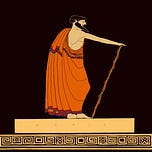




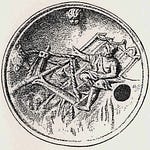

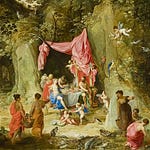
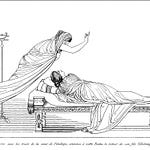
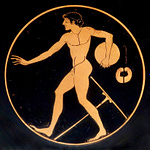

To the Elysian Plain: Homer in English